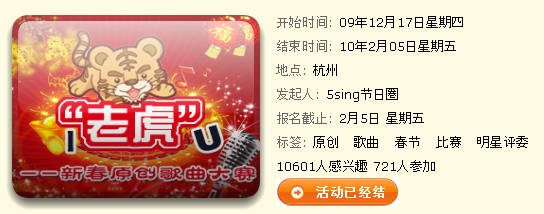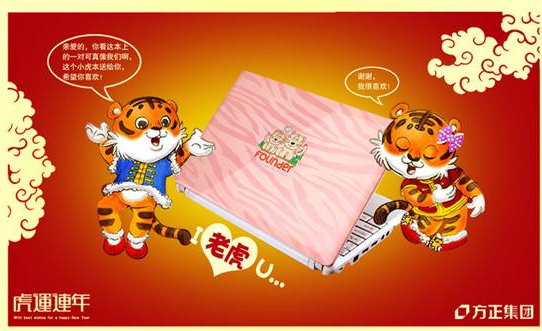I Tiger You
« previous post | next post »
 Last year the most popular new New Year's greeting in China was "Happy NIU2 Year!" where NIU2 ("cow") supposedly sounds like "new."
Last year the most popular new New Year's greeting in China was "Happy NIU2 Year!" where NIU2 ("cow") supposedly sounds like "new."
This year, the most popular new Valentine's greeting in China is "I LAO3HU3 老虎 U," where LAO3HU3 (which means "tiger") allegedly sounds like "love" to Chinese speakers.
Of course, this cute slogan, "I LAO3HU3 / Tiger U," which was probably dreamed up by an advertising firm, reminds one of (and may well have been inspired by) the wildly famous "I Chocolate You" campaign for the LG Chocolate cellphone, in which one of the most memorable images was this voluptuous photograph of the Korean actress, Kim Tai-hee.
"I LAO3HU3 老虎 U" is a current favorite for texting or e-mailing friends, but it's also used in advertisements for bars:

(After reading the comments here, I recommend that LAO3WAI4 ["foreigners"] stay away from this place.)
Also singing contests:

And computers, and so forth:

But this "I LAO3HU3 / Tiger You" slogan / greeting is perhaps more clever than either "Happy NIU2 / Cow Year" or "I Chocolate You," since it not only serves as a Valentine's Day declaration of affection, but simultaneously works as a New Year's greeting, February 14 also being the start of the lunar year in 2010. There's another dimension to the "I LAO3HU3 / Tiger You" slogan / greeting, however, that even its creators were probably unaware of, namely, the association of the word "Tiger" with unrestrained love following the disclosures that were made following that car accident on November 27, 2009 in Windermere, Florida.
Incidentally, the relationship between chocolate and Valentine's Day is much more intense in Japan than it is in the West, since OLs ("office ladies"; Japanese: オーエル Ōeru) are obliged to give chocolate to the sararīman (サラリーマン "salaried man") where they work, except when February 14 falls on a Sunday (such as this year). This custom, which was dreamed up by chocolate manufacturers — naturally! — is called giri-choko (義理チョコ), from giri ("obligation") and choko ("chocolate"), i.e., "duty chocolate." After awhile, and with slight advances in Japanese feminism, this got a bit tiresome, so that now the men are supposed to reciprocate on March 14.
Kellen Parker said,
February 13, 2010 @ 11:00 pm
I remember a text going around in China a couple years ago that was composed of Hanzi but when read out loud it sounded like (poorly computer synthesised) English. "爱老虎语 / ài lǎohǔ yǔ" was definitely part of it, though I can't recall the rest.
mondain said,
February 13, 2010 @ 11:35 pm
In some Chinese dialects / topolects, such as Cantonese and Wu Chinese, '虎' would be pronounced FU which makes '老虎' sound closer to 'love'.
phspaelti said,
February 14, 2010 @ 2:48 am
Just checking (Because it's hard to be sure. So many Korean names are similar.) That is Kim Tae-hee? http://en.wikipedia.org/wiki/Kim_Tae-hee
Kellen Parker said,
February 14, 2010 @ 5:37 am
It's BoA in the Chocolate add.
Southern Mandarin tends to pronounce 虎 as "fu" as well.
Q. Pheevr said,
February 14, 2010 @ 7:50 am
It seems to me that this development is more beneficial to the chocolatiers than it is to the feminist cause….
Faldone said,
February 14, 2010 @ 8:03 am
I wonder if the standard pronunciation of HU in Mandarin is like the standard pronunciation of FU in Japanese, i.e., a bilabial fricative.
fs said,
February 14, 2010 @ 8:16 am
Faldone: Nope. It's a velar fricative, /x/.
Matthew said,
February 14, 2010 @ 9:48 am
Did anyone else think that the title of this post was referring to a 'verbing' of Tiger Woods forename, suggestive of a sentiment precisely opposed to Valentine's Day romancing?
dhd said,
February 14, 2010 @ 11:47 am
The thing that caught my eye is the use of Pinyin to "de-genderize" the third person pronoun in the bar advertisement, along with the rather faithful translation of "TA" into "him/her" in English.
Sili said,
February 14, 2010 @ 1:26 pm
Matthew, yes. Or something like it.
If I were cleverer I'd try to come up with a cougar joke.
Skullturf Q. Beavispants said,
February 14, 2010 @ 1:51 pm
"Cheetah" jokes are probably too obvious, though. Or "lyin'."
Aviatrix said,
February 14, 2010 @ 5:47 pm
March 14th is also a new compensatory occasion for those who give chocolates to women on February 14th.
Lareina said,
February 14, 2010 @ 8:49 pm
March 14th is the White DAY!! which is the day girls gave chocolate to guys.
爱老虎油=I love you….that's funny ^^
but i get no chocolate this year. very depressed.
Victor Mair said,
February 14, 2010 @ 9:17 pm
To explain Lareina's 爱老虎油 a bit more fully. Literally, it means "Love Tiger Balm," Tiger Balm being a widely used ointment: http://www.tigerbalm.com/
The pinyin transcription is AI4 LAO3HU3 YOU2 ("love tiger oil / fat / grease"). But the AI4 ("love") also conveys the sound of "I," while LAO3HU3, as explained in the main post, conveys the sound of "love," and YOU2 ("oil") conveys the sound of English "you." Thus AI4 simultaneously means both "love" and "I," LAO3HU3 simultaneously means both "tiger" and "love," and YOU2 simultaneously means both "oil / fat / grease / balm" and "you."
This version seems to be even more popular (270,000 Google hits) than the "I LAO3HU3老虎 U" version (199,000 Google hits).
Nanani said,
February 14, 2010 @ 9:18 pm
White day is not about reciprocating with chocolates. The return-gift is simply "something white". Often more expensive than chocolates, too.
Nathan said,
February 14, 2010 @ 10:17 pm
Today was also 煮干しの日 (niboshi no hi) in Japan. "Niboshi" are dried sardines used mostly for broth, and have little to do with either chocolate or the calendar. Rather, this is the same magic by which 11/22 became いい夫婦の日 (ii fuufu no hi, "good married couples' day"): numeric substitution.
Japanese numerals, like so much else in the language, have multiple possible pronunciations, and these various syllables can be combined into words. Take the numbers 1-4, which also contain all the digits of today's date and 11/22. In the numeric substitution system we have all of these possibilities:
1 hitotsu, hito, hi, ichi, i, wan
2 futatsu, fu, futa, ni, tsū, tū
3 mitsu, mi, san, sa, surī
4 yon, yo, yotsu, shi, fō
*NB: last entry in each is katakana-fied Japanese pronunciation of the English, which is also fair game. Click here for the Wikipedia explanation.
It is fairly easy to understand how we get "ii fuufu" from 11/22. But what about "niboshi"? Well, that clearly requires a little more trickery. The presticogitation here is substituting 棒 (bou, bar or rod) for the numeral one because the kanji/hanzi is 一, a bar or rod. So there you have it: "ni bo(u) shi."
Now, as to why one would need such a day, especially on such an already crowded date, your guess is as good as mine. But I'm sure somewhere, someone is selling chocolate sardines.
Victor Mair said,
February 14, 2010 @ 10:20 pm
As a friend just reminded me, although this may be the Year of the Tiger, the future looks very bleak for real tigers:
http://www.nytimes.com/2010/02/13/world/asia/13tiger.html
One wonders if there will be any tigers left twelve years from now.
Zev Handel said,
February 15, 2010 @ 12:55 am
I think it's time to start taking bets on what next year's bilingual new year's pun will be.
Clare said,
February 15, 2010 @ 1:58 am
To be a bit pedantic, the Pinyin translation of 爱老虎油 is not AI4 LAO3HU3 YOU2, it's "ài lǎohǔ yóu" — which is a lot easier on the eye and for people whose knowledge of Chinese characters is poor but who have been learning them with the aid of Pinyin, and who want some hope of trying to pronounce them without having to recall which tone is first, second, third etc. The Pinyin shows graphically which are falling, rising etc. and is much easier to read in lower case without the numerals interspersed.
phspaelti said,
February 15, 2010 @ 2:08 am
Kellen Parker said,
I'm no expert on Korean starlets, but I don't think so:
phspaelti said,
February 15, 2010 @ 2:10 am
As usual: @#&! this lousy comment feature.
http://www.youtube.com/watch?v=PNnDwdOfC5A
Pascale said,
February 15, 2010 @ 7:47 am
Perhaps "Happy New Year 兔 (tù, rabbit) You". I wouldn't put it past them.
Kenny V said,
February 15, 2010 @ 2:21 pm
My wife and I used to say "I pizza you" (and represent the same thing pictorially) when we were in high school.
Victor Mair said,
February 15, 2010 @ 7:32 pm
I was very happy that dhd noticed the use of pinyin (TA1) in one of the ads and its proper translation as "he / she." The use of pinyin for all sorts of purposes and effects is gradually increasing, and I shall try to present some of them to LL readers in the coming months.
Anonymous said,
February 15, 2010 @ 8:22 pm
Speaking of Tiger Balm and puns, don't leave out 保心安油 (Po Sum On).
http://www.posumon.com.hk/
http://en.wikipedia.org/wiki/Po_Sum_On
Next time you have a problem, just pour some on.
Tae Hyun said,
February 15, 2010 @ 9:55 pm
To phspaelti.
As a Korean, I can assure you that the woman in the ad is Kim Tae-hee (not Bo-A).
John Cowan said,
February 16, 2010 @ 1:13 am
This reminds me of an anecdote about the American psychological warfare expert and old China hand Paul Myron Anthony Linebarger (林白乐 Lín Báilè) who wrote under the names Felix C. Forrest (a pun on his Chinese name) and Cordwainer Smith:
At the end of World War II, leaflets were dropped on Germany telling soldiers they could surrender by saying Ei Sorrender, which may have given Linebarger the idea.
Elizabeth Coleman said,
February 16, 2010 @ 3:18 pm
My local zoo was featuring the tigers when I visited on Valentine's Day. No mention of love or the Chinese New Year though, surprisingly.
Wolfgang Behr said,
February 17, 2010 @ 5:42 am
Here's a try for Zev:
My bet for 2010 is 伴你愉快, where 伴你 ban1 ni3 = bunny = *hlla-s ;-), "I am with you to make it happy"/"Happy Hare!".
Cheers,
W
ahkow said,
February 17, 2010 @ 1:33 pm
Actually, Tiger Balm is not 老虎油 – it's always branded itself as 虎標萬金油 (hu3-biao1 wan4-jin1-you2 Tiger-brand ten-thousand gold oil).
http://en.wikipedia.org/wiki/Tiger_Balm
The Love Tiger Oil phrase at least dates from the 1993 Huang Feihong (aka Wong Fei Hong in Cantonese) movie 《獅王爭霸》(lit. kings of the lion[-dancers]s fight for dominance), where the titular character (Jet Li) learns English phrases from his love-interest/cousin. A clip of the scene is found below (00:55 onwards).
Interestingly, this phrase only appears in the Mandarin-dubbed version. The subtitles are probably the original Cantonese; they don't match with what the actors seem to be speaking. In the original, Huang/Wong, being a L1 Cantonese speaker, was supposed to mispronounce "I love you" as "咬凹腐乳" (Mandarin yao3 ao1 fu3ru3; Cantonese (Jyutping): au5 nap1 fu6jyu5; lit. "[I] bite dented fermented beancurd").
Clip from movie (Mandarin version): http://v.youku.com/v_show/id_XMTM4ODE0NzAw.html
Transcription: http://www.douban.com/review/1445511/
Pita Kelekna said,
February 18, 2010 @ 7:52 pm
In New York, I attended a Korean celebration of the White Tiger on February 14. Is this specifically Korean, I wonder?
Savage Minds Around the Web | Savage Minds said,
February 20, 2010 @ 3:04 am
[…] of a Tiger: Victor Mair at Language Log wrote a post on how Chinese pop slang use clever transliterations of homonyms (or homonyms of transliterations?) of English words and stock phrases. Up for Valentines Day was […]
Savage Minds Around the Web | Jessica L Lucas said,
February 20, 2010 @ 1:25 pm
[…] of a Tiger: Victor Mair at Language Log wrote a post on how Chinese pop slang use clever transliterations of homonyms (or homonyms of transliterations?) of English words and stock phrases. Up for Valentines Day was […]
Lareina said,
April 6, 2010 @ 1:51 pm
OMG!!! PROF MAIR YOU REPLIED TO ME!!!!
so excited!!